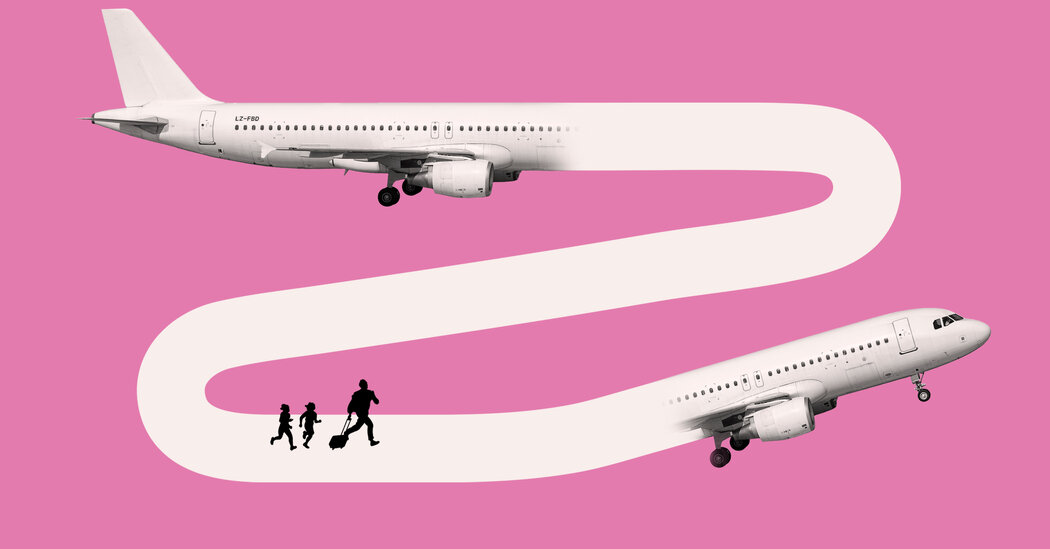
Help! Spirit Airlines Left Us Behind in Guatemala City
04/21/2023Dear Tripped Up,
My two sons and I checked in at the Guatemala City airport three hours before the first leg of our return flight to Detroit. As we waited, I received two texts from Spirit announcing that our flight was delayed, first by about 20 minutes and then by an additional 15, making the new departure time 4:18 p.m. We used the delay to get something to eat, monitoring our phones for more updates, but none came. When we returned to our gate at 3:40, we were told the plane had been readied earlier than expected and the doors had closed. The gate staff said it would be three days before another flight was available, and they refused to book us on another airline. We were forced to spend over $3,000 for same-day, one-way tickets on JetBlue. We eventually received a partial $297 credit from Spirit, but we want them to reimburse us for the JetBlue flight, since they should have alerted us when the departure time was again revised. Tom, Ann Arbor, Mich.
Dear Tom,
If a doctor’s office or hairstylist or friend we’re planning to meet for lunch texts us that they’re running 30 minutes behind, we rightfully feel free to do whatever we want with that half-hour, as long as we show up at the new time. But air travel is an alternative universe filled with odd rules and quirky customs that sometimes fly in the face of real-world logic.
Like you, had I received the same alert, I would have retreated from the crowded, germy gate area to find a restaurant or bar to while away the delay and assumed the airline would ping me if anything changed. But when I polled frequent-flying friends, several told me they would never stray far from the gate. “They always tell you not to go too far,” said one wizened veteran, a consultant who flies nearly every week.
Turns out they’re right and we’re wrong. And Spirit has it in writing.
When I reached out to them, a spokesman for the airline, Erik Hofmeyer, sent me an initial statement noting that “key details were missing” from your story, adding that “section 2.4.1 (b) of our Contract of Carriage has some information that you may find useful.”
For anyone not familiar with Spirit’s terms and conditions — which I’m guessing includes most people reading this as they wait to board a Spirit flight — here’s section 2.4.1 (b):“In the event of a delay, guests are recommended to remain in the gate area for updates and possible early departures. Spirit shall not be liable to any guest who misses a flight, which departed earlier than the estimated departure time posted for the delay.”
For a moment, I thought these lines might have been written just for you (“the Tom from Ann Arbor clause”), but it turns out they were added in late 2014. Spirit is the only airline I could find whose contract is so explicit about the issue, but many note that passengers must be at the gate in advance of the originally scheduled departure time even when there is a delay.
Still, why wouldn’t Spirit send another message updating you when the flight was pushed forward again? Was this a flaw in an automated system, a human mistake, or just the way things work?
Mr. Hofmeyer didn’t provide details, but I did find U.S. Department of Transportation guidelines giving airlines 30 minutes to inform passengers of a change in schedule — perhaps too late in this case — and even then only by updating their website. Mr. Hofmeyer said that agents called your name five times over the public address system, though you say you didn’t hear it.
You asked Spirit to reimburse the cost of your one-way tickets on JetBlue, noting that otherwise you would have been stuck for three more days in Guatemala. Spirit refused, and is within their rights to do so. Department of Transportation guidelines explicitly state that airlines need not book passengers on competing airlines; their next available flight is sufficient, even if it is a few days later. And the airline doesn’t need to pay for your hotel, either. (Don’t shoot the messenger.)
This is mostly bad news for you, but I do have some good news: You got more money back from Spirit than you originally realized. The $279 you received in March was actually their second payment; apparently you didn’t spot a $457 Spirit credit to your card back in January, right after you missed your flight. Mr. Hofmeyer said that the total of $736 covers the full value of the legs you and your family missed. I have no way of verifying that — it’s about a third of the full price you paid for the Spirit tickets, but he did not provide a detailed breakdown. In any case, he made it clear that Spirit is not admitting any fault and that this refund is a courtesy.
Of course, a text alerting you that your departure had been moved back up would have been even better. Spirit would not comment on why you never got one, so I spoke with Suresh Acharya, a professor at the University of Maryland’s Robert H. Smith School of Business who has worked for decades on airline optimization systems. He cautioned that we should not expect all airlines to have equally deft, customer-friendly communications systems. “It may have just been a manual oversight,” he said. “With Spirit or another low-cost, no-frills airline, their IT infrastructure and integration are probably not that automated.”
He noted that since delays are costly to airlines, often requiring overtime payments to crews and causing delays that can ripple across the system, airlines will jump on any chance to speed up departures even after delays have already been announced, although it sometimes means leaving passengers behind. This is especially true on international flights and at domestic “slot-controlled” airports where the F.A.A. has imposed limits on takeoffs.
That said, all delays are not created equal. Mr. Acharya passed along some useful tricks he uses when traveling to better guess when a delay is going to stick, or even “creep” forward, to use frustratingly accurate airline lingo. First, he figures out where the aircraft is. If it’s already at the gate, the delay might not stick if a mechanical issue can be solved faster than projected or crew members stuck in traffic arrive faster than they expected.
If the plane is not at the gate, that could indicate a more definitive or even creeping delay. Check online or ask staff where the incoming aircraft is; if it’s still hours away, that’s a bad sign. On the other hand, if you’re at an airport that serves as the hub of the airline you’re flying (Fort Lauderdale, Fla., for example, for Spirit) they might be able to switch equipment or swap crews more easily.
But I can’t help thinking that there is a very simple solution Spirit could implement that would go a long way toward sparing future customers from your fate: Add one more sentence to its default alerts, urging passengers “to stay at or near the gate at all times.” They could even add, “For more information, click here for the contract of carriage,” giving passengers one last opportunity to avoid reading it.
If you need advice about a best-laid travel plan that went awry, send an email to [email protected].
Follow New York Times Travel on Instagram, Twitter and Facebook. And sign up for our weekly Travel Dispatch newsletter to receive expert tips on traveling smarter and inspiration for your next vacation.
Source: Read Full Article

